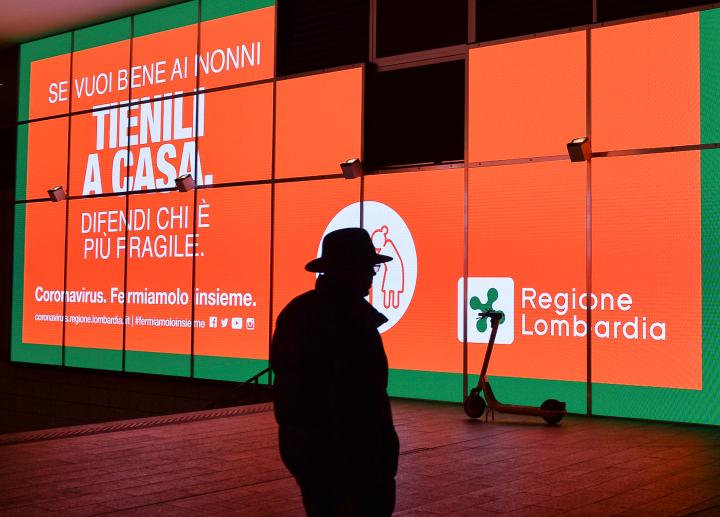COVID-19
Russia deploying coronavirus disinformation to sow panic in West, EU document says

BRUSSELS, March 18 (Reuters) - Russian media have deployed a "significant disinformation campaign" against the West to worsen the impact of the coronavirus, generate panic and sow distrust, according to a European Union document seen by Reuters.
The Kremlin denied the allegations on Wednesday, saying they were unfounded and lacked common sense.
The EU document said the Russian campaign, pushing fake news online in English, Spanish, Italian, German and French, uses contradictory, confusing and malicious reports to make it harder for the EU to communicate its response to the pandemic.
“A significant disinformation campaign by Russian state media and pro-Kremlin outlets regarding COVID-19 is ongoing,” said the nine-page internal document, dated March 16, using the name of the disease that can be caused by the coronavirus.
“The overarching aim of Kremlin disinformation is to aggravate the public health crisis in Western countries…in line with the Kremlin’s broader strategy of attempting to subvert European societies,” the document produced by the EU’s foreign policy arm, the European External Action Service, said.
An EU database has recorded almost 80 cases of disinformation about coronavirus since Jan. 22, it said, noting Russian efforts to amplify Iranian accusations online, cited without evidence, that coronavirus was a U.S. biological weapon.
Most scientists believe the disease originated in bats in China before passing to humans.
Kremlin spokesman Dmitry Peskov pointed to what he said was the lack in the EU document of a specific example or link to a specific media outlet.
“We’re talking again about some unfounded allegations which in the current situation are probably the result of an anti-Russian obsession,” said Peskov.
The EU document cited examples from Lithuania to Ukraine, including false claims that a U.S. soldier deployed to Lithuania was infected and hospitalised. It said that on social media, Russian state-funded, Spanish-language RT Spanish was the 12th most popular news source on coronavirus between January and mid-March, based on the amount of news shared on social media.
The EEAS declined to comment directly on the report.
The European Commission said it was in contact with Google , Facebook, Twitter and Microsoft . An EU spokesman accused Moscow of “playing with people’s lives” and appealed to EU citizens to “be very careful” and only use news sources they trust.
“HUMAN CREATION”
The EU and NATO have previously accused Russia of covert action, including disinformation, to try to destabilise the West by exploiting divisions in society.
Russia denies any such tactics and President Vladimir Putin has accused foreign foes of targeting Russia by spreading fake news about coronavirus to whip up panic.
Russian media in Europe have not been successful in reaching the broader public, but provide a platform for anti-EU populists and polarise debate, analysis by EU and non-governmental groups has shown.
The EEAS report cited riots at the end of February in Ukraine, a former Soviet republic now seeking to join the EU and NATO, as an example of the consequences of such disinformation.
It said a fake letter purporting to be from the Ukrainian health ministry falsely stated here were five coronavirus cases in the country. Ukrainian authorities say the letter was created outside Ukraine, the EU report said.
“Pro-Kremlin disinformation messages advance a narrative that coronavirus is a human creation, weaponised by the West,” said the report, first cited by the Financial Times.
It quoted fake news created by Russia in Italy – which is suffering the world’s second most deadly outbreak of coronavirus – alleging that the 27-nation EU was unable to effectively deal with the pandemic, despite a series of collective measures taken by governments in recent days.
The EEAS has also shared information with Slovakia over the spread of fake news accusing the country’s prime minister, Peter Pellegrini, of being infected with the virus and saying he may have passed on the infection to others at recent summits.
EU leaders have been conferring by videoconferences since early March. (Additional reporting by Anastasia Teterevela in Moscow; Editing by Mark Heinrich)
"Information pertaining to Covid-19, vaccines, how to control the spread of the virus and potential treatments is ever-changing. Under the South African Disaster Management Act Regulation 11(5)(c) it is prohibited to publish information through any medium with the intention to deceive people on government measures to address COVID-19. We are therefore disabling the comment section on this article in order to protect both the commenting member and ourselves from potential liability. Should you have additional information that you think we should know, please email [email protected]"





 Become an Insider
Become an Insider